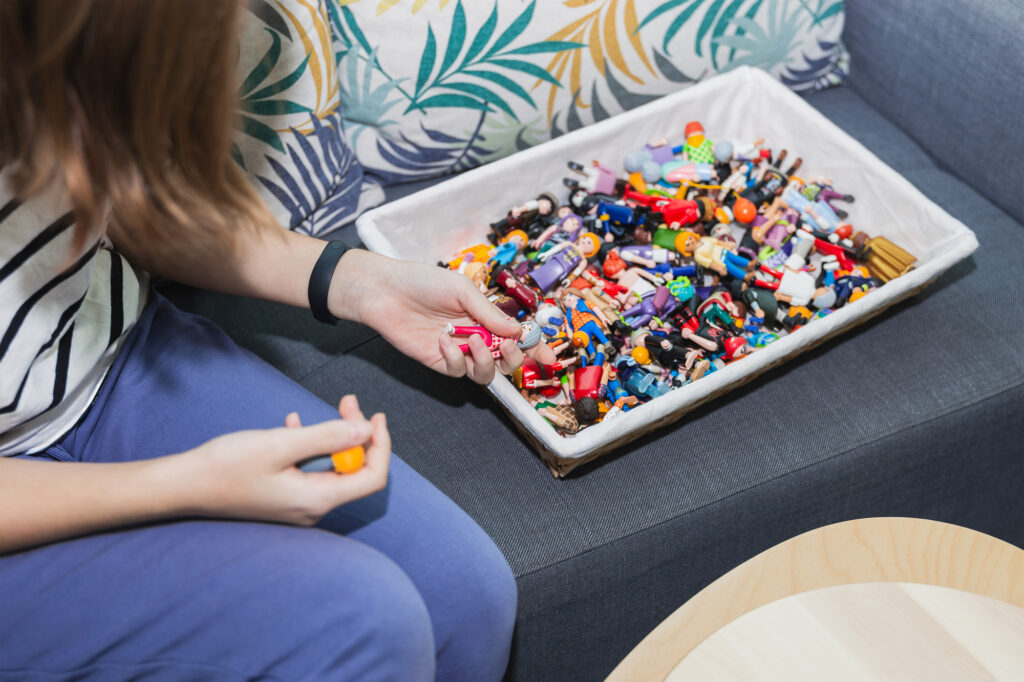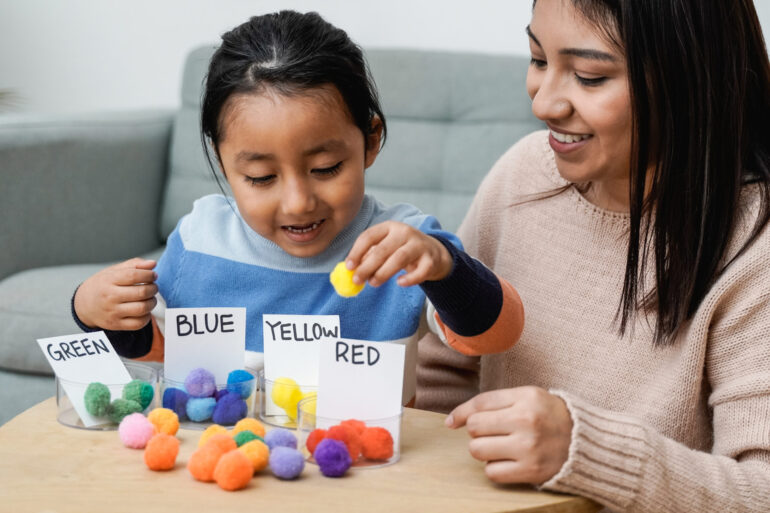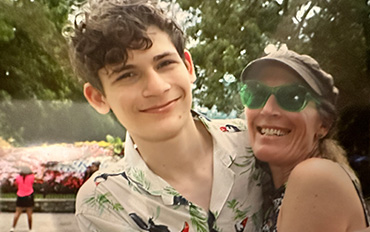Carlos, a six-year-old Hispanic American diagnosed with Autism Spectrum Disorder (ASD), is primarily non-verbal. At the age of two, he was removed from his home due to abuse and neglect linked to his biological parents’ substance use. Carlos and his four siblings, all diagnosed with varying levels of intellectual and developmental disabilities (IDD), suffered from severe neglect, often being locked in a bedroom. In one such instance, Carlos’s brother fell out of a window in an attempt to escape, resulting in severe injury.
At Carlos’s first play therapy session, he initially hesitated before running into the room after spotting a toy of interest. The therapist adopted a non-directive approach, following Carlos’s lead and using reflective language to emphasize his feelings and actions. After moving between toys, Carlos gravitated towards the dollhouse. He paused and stared at the therapist before being reassured, “This is your special playtime. You can play with anything you’d like.” Carlos proceeded to arrange the dollhouse furniture and positioned four dolls in the second-floor room, with two dolls lying on the first floor. As he played, one of the dolls was placed outside the window, mimicking his brother’s traumatic fall.
At this moment, Carlos exhibited distress, running around the room, vocalizing, throwing toys, and knocking items off shelves. The therapist continued to use reflective language, affirming Carlos’s fear. Eventually, Carlos found a toy ambulance, placed the fallen doll in it, and moved the other dolls into a toy bus, seemingly escaping the house. The therapist remarked, “They must all be so scared.” Carlos paused, made eye contact, and transitioned to a different toy before the session ended.
Case reflection
This case underscores several critical principles of play therapy for children with an intellectual or developmental disability (IDD). First, play can serve as a primary therapeutic mode even for children with developmental challenges in similar ways it would for other children not diagnosed with IDD. In Carlos’s case, the non-directive play approach allowed him to explore and process deep-seated trauma through play, highlighting the profound impact of play therapy in addressing non-verbal children’s emotional needs. Second, the therapist’s empathic listening, reflective responses, and emotional validation were pivotal in fostering a safe environment for Carlos to express his emotions, using play as a language when verbal expression was limited by his ASD. Finally, Carlos’s re-enactment of his traumatic experience through the dolls—without needing words—demonstrates how play therapy creates space for emotional processing and trauma healing in children with IDD.
Theoretical background of play
It needs to be noted that the type, severity, and presentation of the IDD could impact the integration of different modes of play into the therapeutic process. However, despite being diagnosed with an IDD, play is a fundamental component of child development. While influenced by culture, language, and environment, play is a universal activity. Play enables children to make sense of the world around them, express emotions, and learn social skills (Pellis & Pellis, 2007). Research has shown that play significantly benefits cognitive, social, emotional, and physical development, as well as promoting psychological well-being, moral understanding, and academic success (Ginsburg, 2007; Piaget, 1962). For children with IDD, these benefits may manifest differently, but remain crucial to their developmental progress (Canevska & Akgün, 2021; Mora & Neill, 2018).
 Children with neurodevelopmental disorders, including IDD and ASD, experience unique challenges and developmental trajectories. These disorders impact the brain and nervous system, creating barriers in communication, learning, and social interaction. Therapists working with children diagnosed with IDD must understand how the family and the child navigate these challenges. Tailoring therapeutic interventions, such as play therapy, can provide children a developmentally appropriate medium to express their emotions, process difficult experiences, and facilitate emotional communication within the family.
Children with neurodevelopmental disorders, including IDD and ASD, experience unique challenges and developmental trajectories. These disorders impact the brain and nervous system, creating barriers in communication, learning, and social interaction. Therapists working with children diagnosed with IDD must understand how the family and the child navigate these challenges. Tailoring therapeutic interventions, such as play therapy, can provide children a developmentally appropriate medium to express their emotions, process difficult experiences, and facilitate emotional communication within the family.
The value of play therapy for children with IDD
Play therapy is uniquely suited for children with IDD because it capitalizes on their natural mode of expression: play. For children who may struggle with verbal communication, play offers an outlet for emotional expression, problem-solving, and processing traumatic or confusing life experiences (Landreth, 2012). For children like Carlos, who are non-verbal, play becomes their “language” through which they communicate their inner world. This non-verbal processing is critical, especially when working with trauma, as play offers a non-threatening, symbolic space where children can safely navigate through painful or confusing experiences.
It is important to acknowledge, however, that play therapy may look different for children diagnosed with IDD. Depending on the diagnosis and individual presentation, children may engage in more concrete or repetitive activities rather than abstract play. They might struggle with understanding rules or interpreting social cues, preferring more structured, guided play or interactions with adults. Children with IDD often rely on non-verbal cues and may need alternative communication methods such as visual aids or gestures. They might also experience heightened or reduced sensitivity to sensory input, influencing the types of toys or activities they engage in during play therapy.
 Despite these differences, play therapy remains a powerful tool for children with IDD. Therapists can adapt the therapeutic environment to suit the child’s specific needs, ensuring that the play experience remains meaningful, healing, and conducive to emotional growth. By honoring the child’s unique form of communication and creating a safe, structured environment, therapists can help children with IDD process complex emotions, build social connections, and ultimately, thrive.
Despite these differences, play therapy remains a powerful tool for children with IDD. Therapists can adapt the therapeutic environment to suit the child’s specific needs, ensuring that the play experience remains meaningful, healing, and conducive to emotional growth. By honoring the child’s unique form of communication and creating a safe, structured environment, therapists can help children with IDD process complex emotions, build social connections, and ultimately, thrive.
Conclusion

Play therapy is an invaluable tool for children diagnosed with IDD, providing them with a natural and accessible way to express emotions, process trauma, and engage with their environment. For children like Carlos, who may lack the verbal capacity to communicate their experiences, play becomes a critical vehicle for healing and understanding. As research and clinical practice continue to demonstrate, integrating play therapy into therapeutic work with children with IDD holds immense promise for enhancing their emotional and psychological well-being, offering them a path toward healing and growth.
Despite these differences, play therapy remains a powerful tool for children with IDD.

Trent Call, PhD, LMFT, is an AAMFT Professional member holding the Clinical Fellow and Approved Supervisor designations. He is Clinical Assistant Professor in the Human Development & Family Studies department at University of New Hampshire in Durham, NH.
Ginsburg, K. R. (2007). The importance of play in promoting healthy child development and maintaining strong parent-child bonds. Pediatrics, 119(1), 182-191. doi:10.1542/peds.2006-2697
Landreth, G. L. (2012). Play therapy: The art of the relationship (3rd ed.). New York: Routledge.
Mora, L., van Sebille, K., & Neill, L. (2018). An evaluation of play therapy for children and young people with intellectual disabilities. Research and Practice in Intellectual and Developmental Disabilities, 5(2), 178-191.
Pellis, S. M., & Pellis, V. C. (2007). Rough-and-tumble play and the development of social competence: The roles of the medial prefrontal cortex and playfulness. Social Development, 16(1), 82-100. doi:10.1111/j.1467-9507.2007.00375.x
Piaget, J. (1962). Play, dreams, and imitation in childhood. W.W. Norton & Company.
Rashikj Canevska, O., & Ramo Akgün, N. (2021). The importance of play for children with autism, cerebral palsy, and intellectual disability. Mediterranean Journal of Educational Research, 2021.
Other articles
Building Bridges: Couples’ Strategies for Thriving with Autism in the Family
Parents of autistic children face numerous stressors that affect various aspects of daily life. The difficulties of raising a child with autism can emerge well before an official diagnosis and persist throughout the family’s life. Specifically, navigating parenthood typically becomes more challenging with a diagnosis of autism due to new emotional challenges, managing behavioral issues, caregiving demands, school-related pressures, financial strain, and lack of adequate support. To meet the demands of raising a child with special needs, parents often shift their focus primarily to their child, which can lead to neglecting their relationship as a couple
Justin Romney, PhD & Allison Montgomery, MSCFT
Embracing New Territories: The Journey of Emotionally Focused Therapy (EFT) in Kenya
It is well-documented that satisfactory intimate relationships are essential to human health; they serve as vital resources that enhance the general resilience of people and their ability to navigate physical and emotional challenges. Conversely, distressed, or unsatisfactory intimate relationships strain both psychological and physical health and are sources of severe psychological distress.
Michelle Karume, DMFT, Ronald Asiimwe, PhD, Rehema Nyambura Gathumbi, MFT, & Mark Maxwell, PsyD
Overcoming Challenges & Enhancing Care for Neurodiverse Families: A Guide for Marriage and Family Therapists
Autism Spectrum Disorder (ASD) is a multifaceted neurodevelopmental condition that affects a child’s social interactions, communication skills, and behavior. Its complexity is reflected in the wide range of symptoms and severity levels it encompasses. Recent statistics show a significant increase in ASD prevalence, with approximately 1 in every 36 children in the U.S. now diagnosed with the disorder (Maenner et al., 2023). The higher prevalence in boys compared to girls—about four times more frequently diagnosed (Maenner et al., 2023)—places an increasing demand on therapists and support systems to address the needs of these families effectively.
Chrystal N. McDowell, PhD



